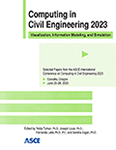AI-Based Digital Twinning for Automated Joint 3D Scene Reconstruction and Semantic Enrichment
Publication: Computing in Civil Engineering 2023
ABSTRACT
Digital twin, with captured as-is information, provides potential for condition monitoring and inspection of the built environment. However, the state-of-the-art digital twin lacks a systematic approach to observing the environment and communicating information to the facility manager due to the incomplete data description capabilities. In addition, capturing as-built geometric information would enhance the digital twin towards smart facility management, but the current employment of 2D computer vision provides limited support to reflect the building conditions for maintenance management. Therefore, this paper presents an AI-based digital twinning approach for automated joint 3D scene reconstruction and semantic enrichment to incorporate the as-is information of the built environment. Two works are researched sequentially: the first concerns integrating BIM data schema with Sensor Model Language (SensorML) to enhance sensor description capability for assorted information queries, and the second focuses on an automated 3D reconstruction and defect detection to enrich digital twin with the as-is condition of the built environment. It is envisaged that the research will contribute to a new method to enhance the digital twin for the built environment including a scientific approach for data mapping between the BIM domain and sensing domain and a new framework for capturing accurate as-built geometric information on the digital twin.
Get full access to this article
View all available purchase options and get full access to this chapter.
REFERENCES
C. Boje, A. Guerriero, S. Kubicki, and Y. Rezgui. Towards a semantic Construction Digital Twin: Directions for future research, Automation in Construction 114 (2020), 103179. https://doi.org/10.1016/j.autcon.2020.103179.
M. Botts, and A. Robin. OpenGIS® Sensor Model Language (SensorML) Implementation Specification. Version 1.0. 0, Wayland, 2007. DOI: https://doi.org/10.25607/OBP-646.
X. Gao, and P. Pishdad-Bozorgi. BIM-enabled facilities operation and maintenance: A review, Advanced Engineering Informatics 39 (2019), pp. 227–247, DOI: https://doi.org/10.1016/j.aei.2019.01.005.
J. Guo, Q. Wang, Y. Li, and P. Liu. Façade defects classification from imbalanced dataset using meta learning‐based convolutional neural network, Computer‐Aided Civil and Infrastructure Engineering 35 (12) (2020), pp. 1403–1418, DOI: https://doi.org/10.1111/mice.12578.
X. Liu, and B. Akinci. Requirements and evaluation of standards for integration of sensor data with building information models, Proceedings of the 2009 ASCE International Workshop on Computing in Civil Engineering, 2009, pp. 95–104, DOI: https://doi.org/10.1061/41052(346)10.
Q. Lu, X. Xie, A. K. Parlikad, and J. M. Schooling. Digital twin-enabled anomaly detection for built asset monitoring in operation and maintenance, Automation in Construction 118 (2020), 103277. https://doi.org/10.1016/j.autcon.2020.103277.
D. Scharstein, and R. Szeliski. A taxonomy and evaluation of dense two-frame stereo correspondence algorithms, International journal of computer vision 47 (1) (2002), pp. 7–42, DOI: https://doi.org/10.1023/A:1014573219977.
M. Schmidt, and C. Åhlund. Smart buildings as Cyber-Physical Systems: Data-driven predictive control strategies for energy efficiency, Renewable and Sustainable Energy Reviews 90 (2018), pp. 742–756, DOI: https://doi.org/10.1016/j.rser.2018.04.013.
S. Tang, D. R. Shelden, C. M. Eastman, P. Pishdad-Bozorgi, and X. Gao. A review of building information modeling (BIM) and the internet of things (IoT) devices integration: Present status and future trends, Automation in Construction 101 (2019), pp. 127–139, DOI: https://doi.org/10.1016/j.autcon.2019.01.020.
M. Theiler, S. Ibáñez, D. Legatiuk, and K. Smarsly. Metaization concepts for monitoring-related information, Advanced Engineering Informatics 46 (2020), 101158. https://doi.org/10.1016/j.aei.2020.101158.
T. Wang, and V. J. Gan. Automated joint 3D reconstruction and visual inspection for buildings using computer vision and transfer learning, Automation in Construction 149 (2023), 104810.
T. Wang, V. J. Gan, D. Hu, and H. Liu. Digital twin-enabled built environment sensing and monitoring through semantic enrichment of BIM with SensorML, Automation in Construction 144 (2022), 104625.
H. Zhu, B.-G. Hwang, J. Ngo, and J. P. S. Tan. Applications of smart technologies in construction project management, Journal of Construction Engineering and Management 148 (4) (2022), 04022010, DOI: https://doi.org/10.1061/(ASCE)CO.1943-7862.0002260.
Information & Authors
Information
Published In
History
Published online: Jan 25, 2024
ASCE Technical Topics:
- Automation and robotics
- Buildings
- Construction engineering
- Construction management
- Design (by type)
- Engineering fundamentals
- Geometrics
- Highway and road design
- Information management
- Joints
- Measurement (by type)
- Models (by type)
- Sensors and sensing
- Structural engineering
- Structural members
- Structural systems
- Structures (by type)
- Systems engineering
- Three-dimensional models
Authors
Metrics & Citations
Metrics
Citations
Download citation
If you have the appropriate software installed, you can download article citation data to the citation manager of your choice. Simply select your manager software from the list below and click Download.
